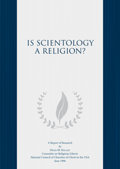The Church of Scientology of California commissioned the author of this report to investigate the question whether Scientology is a religion in a legal sense. The author consented to undertake this task (without fee) by means of interviews with a cross-section of adherents of the Church of Scientology across the country at times and places of his own choosing.
During June, July and August of 1980 interviews were conducted with 21 individuals selected at random at Scientology institutions in Sacramento, California; Albuquerque, New Mexico; Washington, D.C.; and Clearwater, Florida. Each interview sought to elicit how the respondent came into contact with Scientology, what his or her present relation to the movement is, what function it serves in his or her life, and what difference it has made in his or her understanding of ultimate questions of existence.
The purpose of the interviews was not to determine the teaching or tenets of Scientology but to determine what Scientology was doing for the adherent. The approach was similar to that envisioned by a California court in Fellowship of Humanity v. Alameda County in ascertaining whether that non-theistic organization was entitled to tax exemption of its property as a “religion”:
Thus the only inquiry in such a case is the objective one of whether or not the belief occupies the same place in the lives of its holders that the orthodox beliefs occupy in the lives of believing majorities, and whether a given group that claims the exemption conducts itself the way groups conceded to be religious conduct themselves.
153 Cal.App.2d at 6920
Persons interviewed included 13 men and eight women, with eight being full-time church-workers (clergy?) and 13 part-time (laity?). Some had been in the movement for only a year or so, while others had been in it for many years (up to 18 or 20). While there was significant variety in the responses, by the time of the last interviews very little “new” material was emerging, most being repetitious of information and experience already encountered in earlier interviews. Thus, in a sense, one had the feeling of having explored to a “saturation” depth the kinds of answers elicited by the questions being asked.
The interviewer tried not to “telegraph” the object of the interview and to ask open-ended questions wherever possible, following up on terms and ideas mentioned by respondents rather than introducing them cold as in a straight interview-schedule. Questions did not refer to “religion” until respondents did, but instead focused on “what Scientology has done for you.”
Note: The author was executive for religious liberty of the National Council of Churches of Christ in the USA (1960–1990) and Counselor on Religious Liberty (1990– ). The author takes full and sole responsibility for this study and its findings. They are not to be attributed to the NCC or any of its member denominations.





























